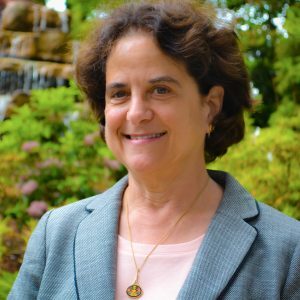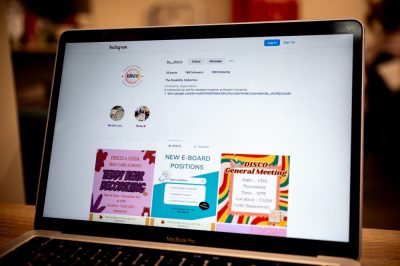Effective in the Spring 2024 semester, Lorre Wolf, director of Boston University Disability and Access Services, is retiring from her position at the office, which students say is challenging to navigate.

“I’ve been fortunate to write, teach, travel and present all over the world as a representative of BU,” Wolf wrote in an email. “I leave with gratitude and thanks, I’ll miss a lot but I’m thrilled to see where what I’ve built goes.”
Wolf’s retirement was announced in an email sent out to her department on Oct. 17 from Dean of Students Jason Campbell-Foster, BU spokesperson Colin Riley said.
“Lorre has done an outstanding job,” Riley said. “Seeing the demand for reasonable accommodations increase exponentially … during her tenure and then [being] able to facilitate that in and assist students with disabilities achieve their success in higher education.”
Wolf will leave effective Jan. 14, 2024, and DAS currently does not have a director that will take over for her in Spring 2024.
Steve Singer, associate dean of students, and Jon White, associate director of DAS, will “provide leadership to the unit” as BU searches for a new director, Riley said.
Wolf wrote that she started at BU “in the wake of a noisy and very public lawsuit,” where the University was a named plaintiff in 1997.
In Guckenberger v. Boston University, six students claimed BU discriminates against students with disabilities by “establishing unreasonable, overly-burdensome eligibility criteria for qualifying as a disabled student.”
In a 1997 Daily Free Press article, Sidney Wolinsky, a disabilities lawyer in the case, called the ruling a “ringing condemnation of BU.”
In her 26 years at BU, Wolf oversaw hundreds of students. She said she is most proud of how her staff responded in the first full residential year post-pandemic when the caseload doubled and there were staff shortages.
“Students came back from pandemic not okay, we saw a huge increase in psychological distress among our existing students as well as students reaching out for the first time,” Wolf wrote.
If she could do it again, Wolf said she would have engaged more with students.
“I wish we had more resources for reaching out to the student community to take their pulse,” she wrote. “It’s been changing but not quickly enough.”
Students shared this sentiment and hope the future director will work to better meet students’ needs.
Julia Cicchillo, a sophomore in the College of Arts and Sciences, spent a lot of time in the summer before her freshman year working to get the accommodations she needed for her Type I Diabetes. She requested breaks of unlimited time during tests in case she was having issues with her blood sugar being too high or too low.
After several emails, many of which were never replied to, a Zoom call with Lorraine Norwich, assistant director at DAS, and an in-person meeting with Norwich, Cicchillo was still not granted her accommodations. When she returned to DAS to explain this, she was informed the problem would be fixed. It never was.
“I’ve just given up on using accommodations because it was such a process to get the correct thing that I need,” Cicchillo said. “I’m dealing with it on my own now.”
Cicchillo said her blood sugar tends to drop low right before tests and that it’s better for her to test with high blood sugar. Because of this and her lack of accommodations, she has had to develop her own method for dealing with this issue.
“I just have to make my blood sugar go really high by eating a lot of food before my exam, which is not healthy,” Cicchillo said. “It’s not good for me, but that’s the only way to assure that it doesn’t go low because it drops when I’m anxious and about to take an exam.”
If given the opportunity to change DAS, Cicchillo said she would make the online process more “user friendly” and quicken their response times.
“They’re just not very good at doing the one thing that they’re supposed to do,” she said.
Skylar Soares, a junior in CAS, said she had an okay experience with Stacey D’Onofrio, the former DAS manager of event communication access. Since D’Onofrio has left BU, Soares said her experience has gone downhill, saying she was “appalled” by how easily her accommodation requests were disregarded.
“I had professors that have given me more leeway than DAS ever has,” Soares said.
Soares’ biggest qualm with DAS is how they handled her housing situation after she came back from chemotherapy and getting her accommodations were “non-negotiable.”
Her condition requires her to live in a single-housing apartment with no roommates because it is a “health concern” if she does.
After taking a leave of absence in 2021 and returning to BU in Spring 2023, Soares was assigned a roommate, despite her making it “very clear” that she would need a single to attend BU, which she said was clearly documented several times by DAS.
“As much as that might seem like a luxury … it is not,” Soares said. “I didn’t know how else I could have illustrated that to [DAS].”
Soares eventually was placed in a single after several conversations with both BU Housing and DAS.
“Disabilities framed my accommodations as an option and not a need,” said Soares said.
Although Soares thinks the DAS staff make the process of receiving accommodations difficult, she said she also believes the policies are detrimental.
The Accommodations and Documentation section of the DAS website outlines: “Students with appropriately documented disabilities who are enrolled in Boston University courses or programs may be eligible for reasonable accommodations.”
Soares found the word “reasonable” to be insulting.
“Any accommodation for me is reasonable because it’s the reason that I can do school,” said Soares. “The professor can change things. The person with the disability cannot.”
Soares, who is also the treasurer of student group BU Disabilities Collective, thinks an improvement for these issues would be a student advisory board, an updated map for the accessibility ramps on campus and more involvement from DAS at orientation.
Julia Band Orange, a sophomore in CAS and secretary for the BU Disability Collective, echoed Soares’ thoughts about more knowledge about ramps on campus and stated the club wants to create more community among people with disabilities at BU.

“It’s a very small organization still, which is largely because there’s no real sense of community here because of the division and fear that DAS and all these disability services have caused in the institution,” said Band Orange.
Band Orange described her own experience dealing with DAS as “challenging” and found it problematic that even when a student was granted an accommodation, their professors could still have authority to change or disagree with the accommodation.
“Basically, the authority of the patient is removed, which is something really problematic when you consider disability rights and the ability for people with disabilities and medical conditions to speak up and have their own independence and say over their lives,” Band Orange said.
Wolf said she wishes it was possible to “say yes to everything,” but that is not always possible.
“Unfortunately, we can’t always approve what students ask for which makes for a negative experience,” she wrote. “People may not realize that along with supporting students we are also charged with upholding academic standards, being sensitive to the needs of the larger community and stewarding resources.”
Payton Harvill, a sophomore in CAS, said she had a simple process with DAS and was “pleased” with the accommodations she received. However, she said her friends with more severe disabilities have not had the best experiences.
“I don’t know if it’s a policy issue, or if the people in the department is an issue, but I think in the sense of my friend there was just a lack of empathy,” Harvill said.
While Harvill’s DAS experience was “neutral,” she touched on the stigma she feels at BU toward people with accommodations due to the competitive nature of the school, which could be difficult to deal with on its own without DAS making things difficult as well.
“If you are working with people who are giving you the accommodations, and they lack that sort of empathy, it’s demeaning in a way,” Harvill said. “Like are they really here to help you?”
For the future, the BU Disability Collective hopes to establish a more supportive environment for disabled students, Band Orange said.
“I know there are people that would be really eager to help advance the awareness for disabilities at the school, so I just think it’s going to be a really hard road because of the boundaries that are set for us and the barriers with accessibility in general,” Band Orange said. “But I think it’s possible. It needs to be brought out of the shadows a bit more.”
Sydney Topf and Lindsay Shachnow contributed to the reporting of this article.























































































































